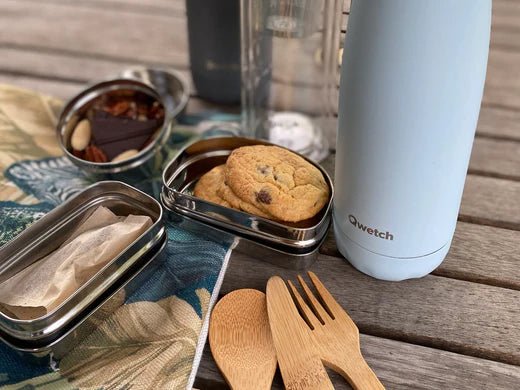Ethical Buying Guide: Tea
Here in the UK, we love a good cup of tea, but in recent years a more murky side has been reported, including inhuman working conditions, lies about where the tea is sourced from and plastic in tea bags.
Luckily for us, Scarlett, Green Tulip's Head of Marketing, has trained with the UK Tea Academy and is a certified Tea Champion! So we asked Scarlett to explain a little more about how tea can be unethical, and as consumers, what we can do to ensure our cuppa is an ethical one.
Can Tea Really Be Unethical?
Sadly, yes. While tea itself is a simple plant, the Camellia Sinensis, the journey from leaf to cup can raise some ethical concerns. Here's how:
- Unfair labor: In some cases, tea production might involve unfair wages and poor working conditions for farmers and tea pickers. And in 2023, the BBC uncovered sexual exploitation on Kenyan tea farms that supply some of the UK's most popular brands, including PG Tips, Lipton and Sainsbury's Red Label.
- Lack of transparency and mislabelling: The origin and processing methods of tea can sometimes be shrouded in secrecy. For instance, in 2016, 40 million kilos of “Darjeeling tea” was sold worldwide. But, Darjeeling’s yearly production is only 8 to 9 million kilos of tea. This makes it difficult for consumers to know exactly what they're buying. Misleading information about the source of tea leaves can be an issue. Consumers might unknowingly be purchasing tea from regions with unethical practices.
- Environmental impact: Conventional tea farming practices can rely heavily on pesticides and fertilisers. This can harm the environment and surrounding ecosystems. Mechanised tea harvesting can also harm local wildlife compared to handpicked tea.
The good news is that there are ways to ensure your tea is ethical! We'll delve into those details next...
What is Ethical Tea?
We believe that tea should go beyond just deliciousness. Ethical tea is about ensuring a sustainable and responsible tea industry, from leaf to cup, for both people and the planet. Here's what sets it apart:
- Fair trade practices: Ethical tea prioritises fair prices paid to farmers for their crops. This improves their livelihoods and fosters a more equitable tea trade.
- Organic farming: Ethical producers champion organic principles, limiting or avoiding harmful chemicals. This protects the environment and promotes biodiversity while producing higher-quality tea.
- Transparency: Ethical brands believe in openness. They share the origin and processing methods of their tea, allowing you to make informed choices.
- Quality over quantity: Forget dusty teabags! Ethical tea often focuses on whole, handpicked loose-leaf teas from specific regions, offering superior flavour and experience.
- Plastic free: Many teabags contain plastic. Look for teabags that are biodegradable, or consider switching to loose leaf tea.
How Ethical is Supermarket Tea?
Supermarkets stock a large number of tea brands, and the ethics behind each brand can vary greatly. We recommend you research the brand you want to buy so you can make an informed consumer decision.
Is Ethical Tea More Expensive?
Packs of 40 value teabags are available to buy at some supermarkets for 25p, that's less than 1p per teabag. It is just not possible to produce tea ethically for this price, and by that we mean paying workers a fair, living wage and using sustainable farming practices and plastic free teabags. So yes in this instance, ethical tea is more expensive.
Another benefit of buying high quality, whole leaf tea it can often be used more than once. Black, white and green teas can usually be steeped 2-3 times, and oolongs and puerh tea steeped up to 10 times, depending on the type and quality of the leaf. Herbal infusions (strictly speaking these are not actual 'teas' are best steeped just the once.
Is Tea Eco-friendly?
Tea itself can be a relatively eco-friendly beverage, especially when compared to other options such as coffee. According to BBC News' "Climate change food calculator," a cup of tea every day adds around 33 pounds to an individual's annual greenhouse gas emissions with coffee coming in at about 10 times.
After water, tea is second-most-consumed beverage in the world. But teabags are ultimately, a single use item. And some actually contain plastic - shedding billions of microplastics into the water. Plastic free tea bags are available, and many ethical tea brands use biodegradable or natural methods for their teabags, so make sure you look for this when buying your tea, or consider switching to loose leaf tea which eliminates the need for teabags altogether.
What Should I Look Out for to Make Sure the Tea I Buy is Ethical?
Here are some key markers of ethical tea:
- Fairtrade certification: Look for the Fairtrade label, ensuring fair prices for farmers.
- Organic certification: This guarantees that the tea is grown organically, minimizing chemical use.
- Direct trade: Brands that directly source from farmers often offer greater transparency and ensure fair prices.
- Company values: Research the brand's commitment to ethical and sustainable practices.
Where Can I Buy Ethical Tea?
Many independent tea shops and online retailers specialise in ethical tea. Here at Green Tulip, we proudly stock a wide range of ethical teas!
What UK Tea Brands are Ethical?
Here are some fantastic examples of ethical UK tea brands that we stock at Green Tulip:
So, explore the world of ethical tea! With every sip, you're not just enjoying a delicious beverage, you're supporting a more mindful and sustainable future for the world we love. Happy steeping!




